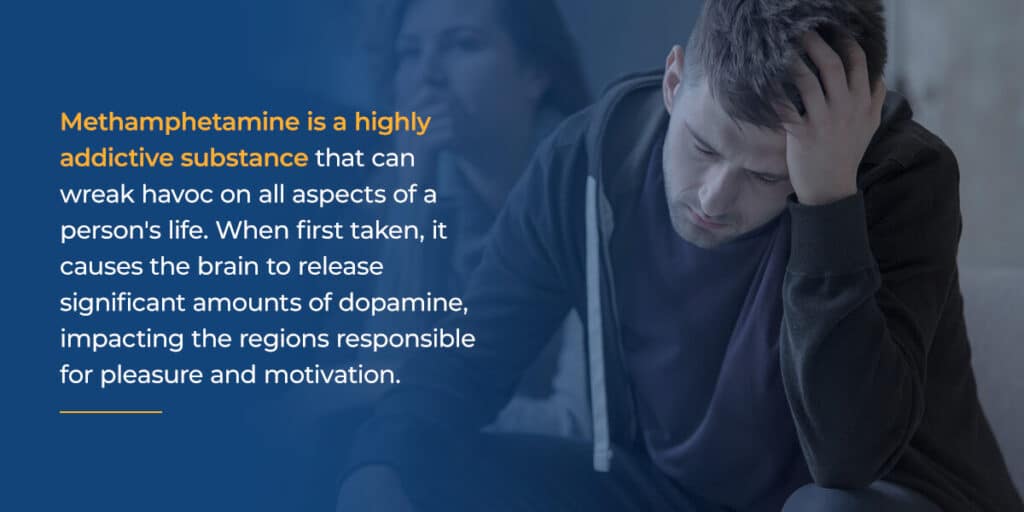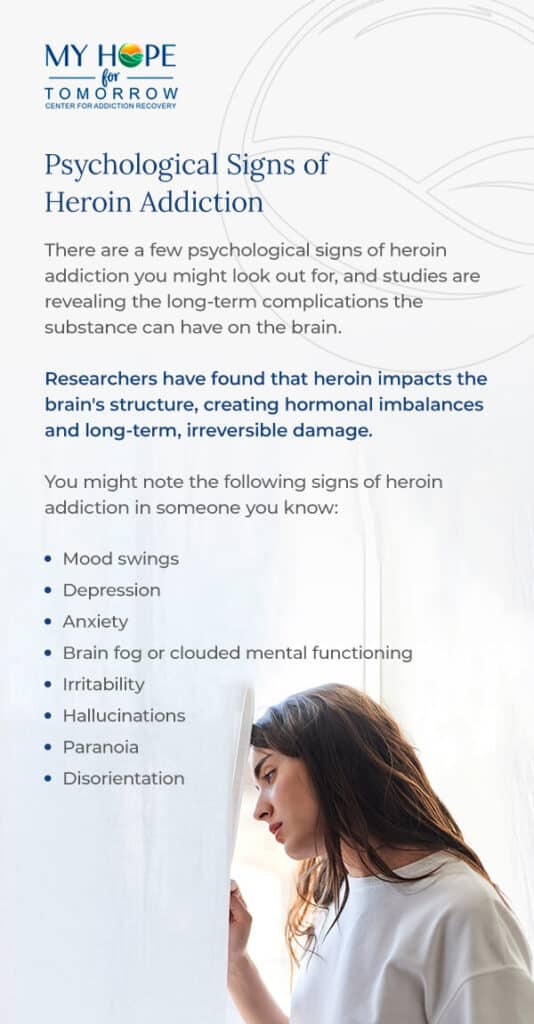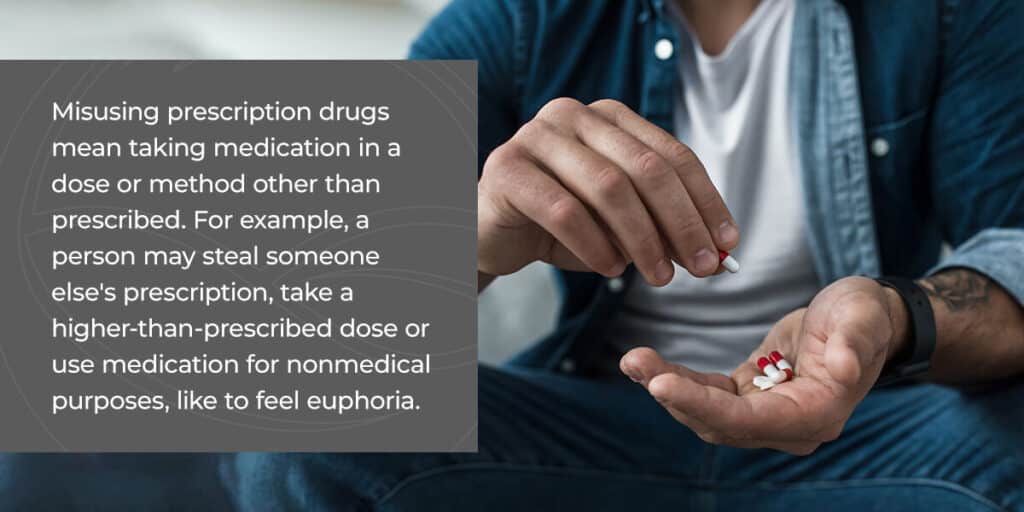

Substance use disorder is a complex condition impacting nearly 46.3 million people in the U.S. It can lead to mental, physical and behavioral changes, causing a person to seek and use substances regardless of the consequences. For instance, people with substance use disorder can experience illness or become depressed and isolate themselves from friends and family.
Fortunately, addiction is treatable. Whether it’s prescription drugs or illicit substances like meth or heroin, learning the signs of addiction can help you determine if you or someone you know needs professional support.
Methamphetamine is a highly addictive substance that can wreak havoc on all aspects of a person’s life. When first taken, it causes the brain to release significant amounts of dopamine, impacting the regions responsible for pleasure and motivation. The initial euphoria subsides quickly, making it highly reinforcing.
The pattern can cause tolerance and dependence, where a person needs increasingly higher doses to achieve the same effects. After a while, you may feel like you need the substance to function, making it challenging to stop without professional help.
Signs and symptoms of meth use will vary depending on how long a person has taken meth and the frequency and amount they use. If you’re unsure if someone you know is experiencing meth addiction, look for the following physical, behavioral and mental changes to get them help.
Meth has one of the highest rates of overdose deaths. Even short-term use can have adverse health effects. The most common are increased wakefulness, decreased appetite, rapid breathing and high body temperature.
Long-term signs of meth use can include the following physical symptoms:
Long-term meth use can also come with complications like HIV and hepatitis B from sharing needles. Withdrawal might lead to abnormal sleep patterns, dry mouth, headaches and appetite loss. Most people lack energy and experience intense cravings for more meth at this stage.
Severe complications from meth addiction can lead to overdose, coma or death. Recognizing the signs can help you or a loved one seek treatment.

Like other substance use disorders, meth addiction can lead to several behavioral changes. Methamphetamine alters judgment and decision-making, leading to risky behaviors like unprotected sex, driving under the influence or sharing needles, all of which can have significant adverse consequences.
The following are other behavioral signs of meth use:
Social withdrawal is one of the first indicators of a struggle with meth use. Someone may distance themselves from the people closest to them, including friends and family, to hide their addiction. Isolation can make it more difficult for them to receive help. That’s why it’s crucial to look for any signs of meth use, as the sooner you reach out, the sooner professionals can treat the symptoms.
Meth use can lead to short and long-term mental health effects. The drug can change the brain’s structure and function, possibly leading to irreversible damage. People have experienced issues with thinking, understanding, learning and remembering. Here are a few psychological and cognitive signs of meth use:
One study found that former methamphetamine users had an increased risk of developing Parkinson’s disease, a nervous system disorder that impacts movement. People with meth addiction can also experience worsened mental health conditions like depression and anxiety.
Like methamphetamine, heroin is an illicit and addictive substance that can change people in numerous ways. Heroin is an opiate, in the same class of drugs as fentanyl and prescription pain relievers. It alters the brain’s pleasure and reward centers and can cause a substance use disorder to develop. Knowing how to spot the signs of heroin addiction can help prevent a person from experiencing adverse outcomes.
Look for the following physical, behavioral and psychological signs of heroin addiction in someone you know.
Heroin use comes with immediate effects when first taken, as well as long-term physical health complications. When the drug enters the brain, it impacts the areas that control heart rate, breathing and sleeping.
Look for the following physical signs of heroin addiction:
Weight loss and lack of appetite are also signs of opioid addiction. You might note changes in someone’s appearance, such as baggy clothing or thinning hair due to nutritional deficiencies.
Heroin can cause drastic behavioral changes due to the drug’s impact on energy. If you suspect someone you know has a heroin addiction, take note of sluggishness or exhaustion. The person may oversleep or fall asleep at random moments, affecting their ability to maintain daily tasks like bathing, exercising or working.
With prolonged heroin use, a person may display the following signs:
As the brain develops a tolerance to heroin, most people will do whatever they can to obtain more opioids and avoid withdrawal symptoms. This behavior can drastically impact relationships, home and work life. They might fail to keep up at work or school and withdraw from friends and family members to hide their addiction.
Signs of opioid addiction can also include impacted decision-making in response to stressful events. These brain changes can make a person in recovery more prone to relapse. Heroin addiction can also lead to increased risk-taking, such as stealing money for drugs or sharing needles. Take note if the person also wears long sleeves or pants to hide track marks, even during warm weather.

There are also a few psychological signs of heroin addiction you might look out for, and studies are revealing the long-term complications the substance can have on the brain. Researchers have found that heroin impacts the brain’s structure, creating hormonal imbalances and long-term, irreversible damage.
You might note the following signs of heroin addiction in someone you know:
Heroin use can also worsen the symptoms of mental health conditions like depression and anxiety. Take note of sudden mood swings ranging from irritability and depression to happiness and hyperactivity. People with addiction can also lose interest in hobbies they once enjoyed, causing a spiral of addiction and depression.
Some people turn to opioids like heroin to self-medicate mental conditions like anxiety because they initially have euphoric effects. However, the longer someone takes heroin, the more likely they are to trigger symptoms of a mental illness, resulting in a problematic cycle. Worsened depression symptoms that can arise during this period include low motivation, emotional detachment or social withdrawal.

Misusing prescription drugs mean taking medication in a dose or method other than prescribed. For example, a person may steal someone else’s prescription, take a higher-than-prescribed dose or use medication for nonmedical purposes, like to feel euphoria. The most commonly misused drugs include the following.
Misusing prescription drugs poses a significant threat to a person’s health. The signs and symptoms can vary depending on the type of substance, the length of use, personality patterns and the dosage taken.
Here’s how to determine if someone you know might be struggling with a cycle of prescription drug misuse.
Different prescription medications will cause various symptoms when misused. CNS depressants slow brain activity, causing the muscles to relax. Physical signs of misuse can include slurred speech, headaches, muscle weakness and problems with movement and memory. It’s also possible to overdose on CNS depressants, resulting in slowed or stopped breathing.
You can notice signs of stimulant misuse like decreased appetites, twitches and jitteriness, weight loss and sweating. Withdrawal symptoms from stimulants can include fatigue, depression and sleep problems. Addiction to stimulants can lead to heart, nerve and stomach problems, making it crucial to know how to recognize the signs of misuse.
Lastly, misusing pain relievers like opioids can result in physical symptoms like drowsiness, nausea and respiratory depression. Since they activate regions involved in reward, taking high doses of pain relievers can induce euphoria or an immense sense of well-being. Misusing prescription opioids puts people at risk of transitioning to illicit drugs like heroin.
Misusing prescription medicines can lead to several sudden behavioral changes. When taking CNS depressants and pain relievers, a person may seem more sluggish than usual, making it more challenging to keep up with their personal and professional responsibilities. They may move slowly, have slurred speech or struggle to participate in social activities.
Stimulants will do the opposite, often leading to excessive energy and motivation, aggressive outbursts and risky or impulsive behaviors. These symptoms will vary based on the substance taken. It’s also common for people going through withdrawal to experience sleeping problems, fatigue and depression. Misusing stimulants can lead to a heart attack or seizure.
Many prescription drugs have a high potential for addiction, even when used as directed. You might notice pills or medication bottles missing from your home, financial problems, declined work or school performance and other dramatic changes in someone close to you.
Misusing any of these types of prescription drugs can lead to short- and long-term psychological effects. CNS depressants can cause mental and cognitive symptoms like confusion, restlessness and agitation. Severe signs and complications can include memory loss, disorientation and impaired judgment and thinking.
Stimulants can lead to drastic changes in a person’s mental health. You might note signs of prescription drug misuse like increased confidence, confusion, anger and paranoia. Severe symptoms can include psychosis, hallucinations, poor judgment, hyperfocus and depression, aggressiveness and anxiety.
Lastly, misusing prescription pain relievers can cause psychological symptoms like drastic mood changes, increased anxiety, irritability, agitation and feelings of depression.
Whether someone you know is struggling with an illicit or prescription drug, professional addiction treatment can help. They can benefit from many recovery tools, including medication-assisted treatment for a safer detox, behavioral therapies and social support groups.
At Hope for Tomorrow, you can appreciate amenities like:
We believe the best approach to addiction recovery targets all aspects of a person’s symptoms and history. If you or someone you know shows signs of drug addiction, our treatment programs will introduce you to a team of experts eager to help.
Family counseling, cognitive behavioral therapy and group counseling can help people identify addiction triggers, adopt healthy coping skills and feel supported in recovery. Specific medications can help minimize withdrawal symptoms, chemical imbalances and cravings, including disulfiram, naltrexone and acamprosate.
With the benefits of these medicines and the support from counseling sessions, you can feel more motivated and optimistic about your recovery journey.